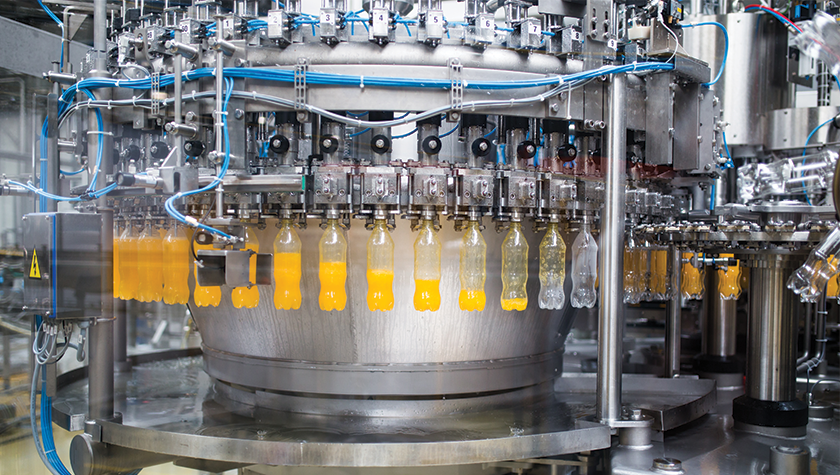Do I Need a Coriolis or Magnetic Flow Meter for My Food Processing Application?

DO I NEED A CORIOLIS OR MAGNETIC FLOW METER FOR MY FOOD PROCESSING APPLICATION?
By Brad Smith
For those responsible for making food and beverage products, metering is money!
Choosing the right metering solution for flow monitoring and batch control is a big decision – with significant budget and production implications.
Your choice of meter can impact your ability to maintain product consistency and effectively manage ingredient costs. And with one-meter type priced at 3 to 4 times more than the other… you want to make sure you get the decision right.
To help, we’ve outlined the pros and cons of both meters and provided a comparison chart.
Ready-made for sanitary processing
The two most common meters for this purpose are Coriolis meters and magnetic flow meters (magmeters).
Sanitary Coriolis and magnetic flow meters are both well-suited to food and beverage applications. They are non-mechanical, with no moving parts (which sets them apart from Sanitary Turbine Meters). They are made from stainless steel and are compatible with clean-in-place (CIP) systems. Either meter is suited for use in constricted spaces, due to minimal straight pipe run requirements.
Both can be used for simple monitoring, or as components in a batch control or other regulated system. They can be valuable for ensuring you get what you paid for when it comes to custody transfer applications.
Determining which is right for you will depend on your product, your ingredients and your processes.
Coriolis Mass Meters
Greater accuracy. Ideal for managing viscous liquids.
The Coriolis meter is considered the ‘gold standard‘ for batch control and flow metering applications involving a high degree of accuracy, the measurement of viscous liquids, and operating condition
It works on the Coriolis Principle. Liquid or gas moves through oscillating tubes. The inertia causes the tube to twist proportionately. Sensors capture mass flow rate with a high degree of accuracy.
A Coriolis meter is designed to measure volume, mass, and density (which explains why they’re also known as “mass meters”). This is why they are suited for measuring thicker, more challenging fluids – such as syrups at densities of 0.1 °Bri (1,000/m3).*
When accuracy matters
Coriolis meters are prized as the meter of choice for applications requiring precision measurement for consistent quality control. Leading models can provide accuracy in liquids (mass or volume flow) up to +/- 0.1% of flow rate, with +/- 0.05 repeatability.*
Having an extra degree of precision can result in significant savings when it comes to managing expensive ingredients as part of the batch control process. It is one of the reasons this type of meter is the preferred choice among beverage processors.
Stands up to challenging conditions
This technology is also suited to challenging operating conditions involving high pressure and temperatures: from -60°C to +200°C (-76°F to +392°F).*
Installation support required
Coriolis meters are the more complex option to set up. Every installation requires custom configuration. It’s important to work with a knowledgeable full-service supplier who can help you with sizing, installation, calibration and commissioning. Generally, the installation team will work hand-in-hand with engineers to choose the right system based on operating criteria.
Did you know? Flow meters should be sized based on flow rate, not pipe diameter.
Magnetic Flow Meters
High-performance flow monitoring in sanitary applications
If you are simply measuring the flow volume of a conductive, non-viscous fluid – and require a dependable, easy-to-use, plug-and-play metering solution, a magnetic flow meter is the solution for you.
Magnetic flowmeters use an electrical current to create an electromagnetic field. This allows sensors inside to measure the rate at which conductive fluids pass. They provide a relatively high degree of accuracy (+/- 1%).**
Are your fluids conductive?
Magmeters will only work with fluids that carry a magnetic charge. This includes liquids with a high concentration of water (such as wine, soup, juice, milk, yogurt, flavourings and ice cream mixes). A magnetic flow meter will not function with non-conductive fluids, such as oils.
A workhorse that provides exceptional value.
The other major advantage of magnetic flowmeters is a significantly lower upfront purchase and installation cost. Magmeters provide dependable, long-lasting performance for a fraction of the price of a Coriolis meter.
Temperature tolerances are generally within the range for most food and beverage applications. For example, Flowmotion’s MS2420 is rated between -20°C to 110°C (-4°F to 230°F)
Coriolis Mass Flow Meter vs. Magnetic Flow Meter

Every situation is different. Talk to an expert.
As you can see, Coriolis and magnetic flow meters each have specific areas where they excel, as well as notable limitations. That said, every processing application is unique. In some cases, the meter that seems like the right choice on the surface may not be wholly suited to the task at hand.
Before you buy, schedule a consultation with an equipment supplier who has the knowledge to ask the right questions – and provide informed answers. As we said, metering is money.



